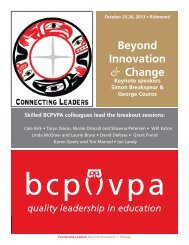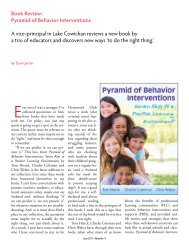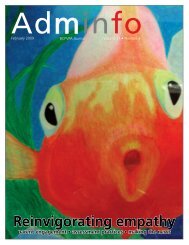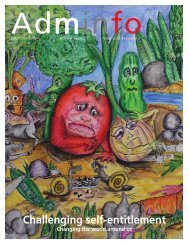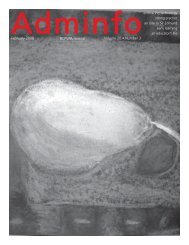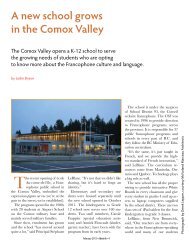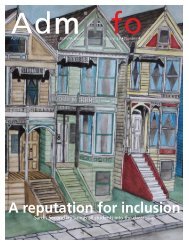Adminfo - and Vice Principals
Adminfo - and Vice Principals
Adminfo - and Vice Principals
Create successful ePaper yourself
Turn your PDF publications into a flip-book with our unique Google optimized e-Paper software.
<strong>Adminfo</strong><br />
June 2011<br />
BCPVPA Journal<br />
Volume 23 • Number 5<br />
School Culture<br />
Independent Study<br />
& international experiences
Look back in<br />
pleasant surprise<br />
BCPVPA President Jameel Aziz writes about the pleasant<br />
surprises <strong>and</strong> challenges encountered during<br />
his first year as President.<br />
When we transition from one<br />
position or profession to another,<br />
I think, we all have an idea of<br />
what we believe that change will look<br />
like <strong>and</strong> how we will go about doing<br />
our business. I certainly thought I<br />
2010 — 2011<br />
Board of Directors<br />
President Jameel Aziz (Kamloops/Thompson)<br />
jaziz@bcpvpa.bc.ca<br />
Past President Marilyn Merler (Vernon)<br />
mmerler@sd22.bc.ca<br />
Directors<br />
Jessica Antosz (Qualicum)<br />
jantosz@sd69.bc.ca<br />
Parm Armstrong (Kamloops/Thompson)<br />
parmstrong@sd73.bc.ca<br />
Laurie Birnie (Coquitlam)<br />
LBirnie@sd43.bc.ca<br />
Shelley Green (Nanaimo-Ladysmith)<br />
sgreen@sd68.bc.ca<br />
Reid Findlay (North Okanagan-Shuswap)<br />
rfindlay@sd83.bc.ca<br />
Rod Giles (Kootenay Lake)<br />
rgiles@sd8.bc.ca<br />
Brian Jackson (Burnaby)<br />
Brian.Jackson@sd41.bc.ca<br />
Jim Mah (Peace River South)<br />
Jim_Mah@sd59.bc.ca<br />
Elaine McVie (Greater Victoria)<br />
emcvie@sd61.bc.ca<br />
ISSN: 1201-4214<br />
knew what was ahead when I moved<br />
from Principal at Chase Secondary<br />
to President of the BCPVPA <strong>and</strong> to<br />
some extent I was correct … that’s<br />
not to say that there weren’t surprises<br />
<strong>and</strong> challenges along the way.<br />
To begin with I was fortunate<br />
that the BCPVPA has a<br />
great model to support this<br />
transition — with the President-Elect<br />
working with<br />
the sitting President for a<br />
year before assuming the<br />
new job full-time <strong>and</strong> then,<br />
in the new President’s first<br />
year, the Past-President stays<br />
on to provide advice, continuity<br />
<strong>and</strong> an underst<strong>and</strong>ing<br />
of Association directions. I<br />
know other organizations<br />
would love to have a similar<br />
model. However, even with<br />
that great model <strong>and</strong> builtin<br />
support, the role can be<br />
challenging as it is very different<br />
compared with the<br />
school principalship that<br />
many of us come from.<br />
Early in my first year, I<br />
was pleasantly surprised by<br />
the number of BCPVPA<br />
members engaged with the<br />
business of the Association<br />
<strong>and</strong> actively involved in the<br />
work that we do. The regular<br />
feedback that I receive from<br />
members after our events,<br />
Chapter Councils or when<br />
the weekly eNews is distributed<br />
is gratifying. Regular feedback,<br />
whether positive or negative, is welcome.<br />
I often think about how nice<br />
it would be to receive more feedback<br />
in our schools. We provide regular<br />
feedback to those we work with but,<br />
often, we do not receive anything directly<br />
ourselves. The communication<br />
with members has been a huge plus<br />
for me <strong>and</strong> I thank those of you who<br />
provide it for taking the time <strong>and</strong> the<br />
energy to do so.<br />
I was also struck early on by the<br />
challenges involved in speaking to<br />
partners <strong>and</strong> the media. The public<br />
opinions of the BCPVPA President<br />
must reflect a spectrum of beliefs <strong>and</strong><br />
philosophies. I have never forgotten<br />
that when I speak I am speaking<br />
on behalf of the entire membership.<br />
Although there are issues that will<br />
never find consensus among the entire<br />
membership, the Board <strong>and</strong> I do<br />
our best to ensure that our statements<br />
represent principals <strong>and</strong> vice-principals<br />
well <strong>and</strong> enhance the public’s<br />
image of them.<br />
I have also been pleased by the<br />
level of engagement we have had this<br />
year with our partner groups <strong>and</strong> the<br />
government. Our conversations <strong>and</strong><br />
interactions remain positive <strong>and</strong> professional.<br />
There is recognition from<br />
continues page 18
A Rw<strong>and</strong>an experience<br />
After 18 months in Rw<strong>and</strong>a, a BC educator <strong>and</strong> his family, abruptly return<br />
to Canada, but the experience has enriched the Thiessens <strong>and</strong> will shape<br />
the way they look at the world.<br />
by Mark Thiessen<br />
Mark addresses a class in a rural Rw<strong>and</strong>an primary school.<br />
Looking back on it, I<br />
would have rather been<br />
Medevac’ed out of Rw<strong>and</strong>a<br />
in a helicopter. Two paramedics<br />
would have jumped out<br />
of the chopper with their heads<br />
ducked low to avoid the propeller<br />
as they rushed a stretcher to<br />
the waiting ambulance. There,<br />
they would have found their<br />
patient on death’s door, whisking<br />
him off to Kenya or South<br />
Africa or maybe, just maybe, to<br />
a jet that would take him home<br />
to Canada.<br />
Alas, it was not to be. My<br />
family’s early exit from our twoyear<br />
sojourn to Kigali, Rw<strong>and</strong>a<br />
would be far less glamorous <strong>and</strong><br />
hardly the stuff of a novel the<br />
June 2011 • <strong>Adminfo</strong> • 3<br />
reader just can’t put down.<br />
Seventeen months into my<br />
stint as the Program Director<br />
for The Wellspring Foundation<br />
for Education, I woke up one<br />
November morning with a left<br />
eye that wouldn’t stop tearing,<br />
was extremely sensitive to the<br />
sunlight sneaking through the<br />
curtains, <strong>and</strong> was more pain-
Mark <strong>and</strong> Dr. Piet at the Kabgayi Eye Unit in<br />
Gitarama, a day before returning home.<br />
ful than any eye ailment I had<br />
ever experienced before. Over<br />
the next five weeks, I would see<br />
five ophthalmologists (half of<br />
the eye specialists in the entire<br />
country) <strong>and</strong> visit three hospitals<br />
<strong>and</strong> a medical clinic in two<br />
cities. I would also receive three<br />
different diagnoses as well as<br />
numerous other speculations.<br />
Finally, I met ophthalmologist<br />
number five. His name was Dr.<br />
Piet, <strong>and</strong> he was a Belgian eye<br />
specialist working in Gitarama,<br />
an hour away from our home<br />
in Kigali. Dr. Piet was in the<br />
middle of a three-year contract<br />
in Rw<strong>and</strong>a, conducting mostly<br />
cataract surgeries for locals who<br />
often walked many<br />
hours, sometimes even<br />
days, to see him. After<br />
a careful examination,<br />
Dr. Piet suspected that<br />
I may have contracted<br />
a parasite, but he had<br />
no way of conducting<br />
a lab test to confirm his<br />
suspicions. For a week,<br />
he treated a few of the<br />
symptoms, but nothing<br />
substantially changed. Two days<br />
after Christmas, my wife <strong>and</strong> I<br />
could no longer live with the<br />
uncertainty of a condition that<br />
could conceivably be worsening<br />
by the day without treatment.<br />
A week later, I had returned<br />
to Canada on regularly scheduled<br />
flights with no emergency<br />
medical evacuation necessary.<br />
Upon seeing a corneal specialist<br />
in Vancouver <strong>and</strong> the appropriate<br />
lab tests finally being carried<br />
out, I was diagnosed with a rare<br />
affliction called acanthamoeba<br />
keratitis.<br />
The acanthamoeba parasite<br />
is a single-celled organism that<br />
normally feeds on bacteria <strong>and</strong><br />
yeast. It does not usually need a<br />
host, but if it finds one, its appetite<br />
becomes voracious. Lucky<br />
for my parasitic friend, I was<br />
the perfect host. First, living in<br />
Rw<strong>and</strong>a, I likely gave the parasite<br />
many chances to stop by for<br />
a visit. Unclean water is generally<br />
where the parasite hangs out,<br />
so we could easily have had our<br />
first blind date (pun intended)<br />
in our bathroom shower, swimming<br />
in Lake Kivu, st<strong>and</strong>ing<br />
under a brown waterfall or even<br />
swimming at a local hotel swimming<br />
pool.<br />
After that initial meeting, I<br />
remained very hospitable to<br />
my guest. Subst<strong>and</strong>ard contact<br />
lens care – wearing my daily<br />
wear lenses for too many days<br />
<strong>and</strong> not completely changing<br />
my solution everyday – allowed<br />
the parasite to create a comfortable<br />
home for itself. For good<br />
measure, once the intense pain<br />
<strong>and</strong> light sensitivity arrived on<br />
that fateful November morning,<br />
I made him feel even more at<br />
home by wearing my air travel<br />
blindfold, thereby ensuring my<br />
Follow the BCPVPA<br />
on Twitter<br />
to receive<br />
short,<br />
timely updates.<br />
<strong>Adminfo</strong><br />
VOLUME<br />
23<br />
NUMBER 5<br />
<strong>Adminfo</strong> is published five times per year by the BC <strong>Principals</strong>’ & <strong>Vice</strong>-<strong>Principals</strong>’ Association.<br />
Subscriptions for non-members of the Association are available for $33.60 per year, including<br />
HST. <strong>Adminfo</strong> welcomes your editorial contributions <strong>and</strong> student artwork. All material should<br />
be sent to: Richard Williams, Editor, <strong>Adminfo</strong>, #200-525 10 th Avenue West, Vancouver V5Z 1K9<br />
[call 604-689-3399 or 800-663-0432, fax 604-877-5381 or email: rwilliams@bcpvpa.bc.ca].<br />
http://www.twitter.com/bcpvpa<br />
Editor<br />
Richard Williams<br />
June 2011 • <strong>Adminfo</strong> • 4
visitor had a warm, moist <strong>and</strong><br />
cozy existence.<br />
Acanthamoeba was first established<br />
as a cause of human disease<br />
in the 1970s, <strong>and</strong> the parasite<br />
can cause three clinical syndromes,<br />
based on how the parasite<br />
gains entry into the human<br />
body: granulomatous amebic<br />
encephalitis or GAE (the brain),<br />
disseminated granulomatous<br />
amoebic disease (skin, sinus,<br />
<strong>and</strong> pulmonary infections), <strong>and</strong><br />
acanthamoeba keratitis (the<br />
eye). Fortunately for me, the<br />
acanthamoeba parasite entered<br />
door number three. While acanthamoeba<br />
keratitis can be vision<br />
threatening, GAE is usually fatal<br />
(nearly 100% of the time).<br />
In none of my research have I<br />
found that the acanthamoeba in<br />
my eye could eat its way through<br />
my eye <strong>and</strong> into my brain, so<br />
upon diagnosis, my wife <strong>and</strong> I<br />
were able to rest assured that I<br />
wouldn’t be pushing up daisies<br />
anytime soon.<br />
Some friends put it best when<br />
they commented on the irony<br />
of it: “With all your preparations,<br />
all the shots, <strong>and</strong> after<br />
a year <strong>and</strong> a half in Africa you<br />
didn’t get malaria, you weren’t<br />
attacked by a mountain gorilla<br />
or a lion, <strong>and</strong> you didn’t succumb<br />
to a weird insect bite. No,<br />
you were felled by daily use contacts.<br />
That’s not much of a scar<br />
to come back with <strong>and</strong> hope for<br />
any bragging rights.”<br />
With my diagnosis came the<br />
advice from my corneal specialist<br />
that I should not return to<br />
Rw<strong>and</strong>a. Instead, he prescribed<br />
a daily regimen of 34 eye drops<br />
(four different medications)<br />
taken at least 15 minutes apart,<br />
including through the night. I<br />
had appointments every three to<br />
four days at the beginning so the<br />
parasite could be closely monitored.<br />
I was taking a plethora of<br />
eye drops, my specialist was becoming<br />
my new best friend, <strong>and</strong><br />
most crushing, I was not going<br />
back to Rw<strong>and</strong>a.<br />
Five weeks after my return,<br />
my wife <strong>and</strong> children followed<br />
me to Canada. While I spent<br />
the month in Vancouver close<br />
to my specialist, Tracey, with the<br />
help of my parents, packed up<br />
our lives in Rw<strong>and</strong>a. Expecting<br />
to spend another six months in<br />
Kigali, it was an emotional departure<br />
as the family said goodbye<br />
to colleagues <strong>and</strong> friends,<br />
many of whom we may never<br />
June 2011 • <strong>Adminfo</strong> • 5
The Thiessen family is surrounded like celebrities as they check out a<br />
Wellspring construction project.<br />
see again.<br />
As difficult as the farewells<br />
were, the transition back to life<br />
in Canada was no easier … especially<br />
in the middle of frozen<br />
February. It can be a bit of<br />
a shock to the system to come<br />
from 30 degrees above to 30 degrees<br />
below in the space of a few<br />
days.<br />
A few months later, we are still<br />
adjusting, <strong>and</strong> as we reflect on<br />
our 18 months in Rw<strong>and</strong>a, in<br />
spite of my present health issues,<br />
we have absolutely no regrets.<br />
For our Rw<strong>and</strong>an adventure<br />
to be deemed successful for our<br />
family, it had to be successful<br />
for our children. They would<br />
agree that it was. It was essential<br />
that their school experience<br />
was positive. Their time at Kigali<br />
International Community<br />
School will give them lifelong<br />
memories. They were fortunate<br />
to be in the presence of passionate<br />
teachers who brought with<br />
them a global perspective to<br />
much of what they taught. The<br />
kids were equally privileged to<br />
make friends from all over the<br />
world. In one of our son’s classes,<br />
there were 15 nationalities<br />
represented by the 18 students<br />
in the class.<br />
Our children were also able to<br />
see <strong>and</strong> experience a world that<br />
few of their Canadian peers will<br />
ever get to experience. Every<br />
day, they saw those so much less<br />
fortunate than themselves who<br />
were happy, hopeful <strong>and</strong> generous<br />
in spite of their life circumstances.<br />
Another important part of<br />
family life in Rw<strong>and</strong>a was just<br />
that – family life. Life in a developing<br />
country meant fewer activities<br />
for the children at school<br />
<strong>and</strong> outside of school. It was a<br />
June 2011 • <strong>Adminfo</strong> • 6<br />
refreshing break to have no<br />
hockey, no soccer, <strong>and</strong> no music<br />
lessons. Instead, we could<br />
be more purposeful in planning<br />
activities within our family<br />
<strong>and</strong> with other families. We<br />
actually had time in our daily<br />
calendar. It was good to have<br />
time to take a weekend drive<br />
through some of the rural villages<br />
or play a game of Frisbee<br />
golf on the compound where<br />
we lived.<br />
Africa has come by its reputation<br />
of a much slower pace<br />
of life quite honestly. In my<br />
work life, the slower tempo often<br />
drove me to insanity. When<br />
meeting with Ministry of Education<br />
officials, it was not unusual<br />
to wait two to three hours after<br />
an agreed upon appointment<br />
for someone to be available. I<br />
soon came to learn that schedules<br />
meant little to my African<br />
counterparts. If I had booked<br />
an appointment a week before,<br />
I would call the day before to<br />
remind the person that we had<br />
scheduled an appointment <strong>and</strong><br />
then I would call the morning of<br />
the meeting to again make sure<br />
something else had not taken<br />
priority over our meeting. Even<br />
with all of the precautions taken,<br />
I sometimes arrived at the meeting<br />
to find out that the Minister<br />
of Education had summoned all<br />
of the managers to an emergency<br />
meeting. If that was the case,<br />
the entire process would start all<br />
over again the next week.<br />
Spending a year-<strong>and</strong>-a-half<br />
Follow the BCPVPA on Twitter & receive short, timely updates.<br />
http://www.twitter.com/bcpvpa
in Rw<strong>and</strong>a also reminded<br />
me how much we have to be<br />
thankful for in our education<br />
system. I have written in<br />
previous articles about class<br />
sizes <strong>and</strong> low wages in African<br />
schools, but the general<br />
disrespect given to educators<br />
by parents <strong>and</strong> community<br />
members is something that<br />
will stick in my memory.<br />
While we sometimes feel undervalued<br />
by our students’<br />
parents, comparatively speaking<br />
we are held in high esteem<br />
in Canadian schools.<br />
Each <strong>and</strong> every day in the beginning<br />
of our time in Rw<strong>and</strong>a,<br />
I fought off my natural instinct<br />
that had me believing that I was<br />
the expert <strong>and</strong> the people with<br />
whom I worked were the empty<br />
vessels. Of course, in most ways,<br />
it was certainly the reverse. I<br />
learned much more from both<br />
my Rw<strong>and</strong>an <strong>and</strong> international<br />
colleagues than I was able to offer<br />
them in return.<br />
On top of our experiences in<br />
Rw<strong>and</strong>a, we were also fortunate<br />
to safari in Ug<strong>and</strong>a’s Queen<br />
Elizabeth Park <strong>and</strong> relax on the<br />
shores of the Indian Ocean in<br />
Mombasa, Kenya. On top of<br />
that, I checked one off my personal<br />
bucket list when I visited<br />
Cape Town, South Africa to<br />
attend a World Cup match in<br />
June 2010.<br />
My wife <strong>and</strong> I would highly<br />
recommend an international experience<br />
as a part of your career.<br />
I was fortunate to have a spouse<br />
who shared my dream <strong>and</strong> to be<br />
able to volunteer for a fantastic<br />
organization that supported<br />
Eli Thiessen (in the red Canada shirt), 5, poses with students from all over the<br />
world in his Kindergarten class at Kigali International Community School.<br />
our family during our stay <strong>and</strong><br />
long before we left Canada in<br />
the summer of 2009. If you’re<br />
thinking about the possibilities,<br />
please do not allow your children<br />
to be an excuse to delay<br />
your adventure until they have<br />
left home. In fact, including<br />
them will only enrich the journey<br />
tenfold.<br />
They say that once you have<br />
lived in Africa, the continent<br />
will remain in your blood. I’m<br />
not sure Africa is now in my<br />
blood, but our time in Rw<strong>and</strong>a<br />
will be a rich part of our family<br />
story forever!<br />
Mark Thiessen was on leave from the Cariboo-Chilcotin School District when he<br />
worked in Rw<strong>and</strong>a. This is his fourth article about his experiences. Mark has returned<br />
to Canada <strong>and</strong> can be reached at mark.thiessen@sd27.bc.ca<br />
June 2011 • <strong>Adminfo</strong> • 7
Book Review:<br />
Pyramid of Behavior Interventions<br />
A vice-principal in Lake Cowichan reviews a new book by<br />
a trio of educators <strong>and</strong> discovers new ways ‘to do the right thing.’<br />
by Dani Garner<br />
Ever since I was a teenager, I’ve<br />
collected quotations or lines<br />
from books that have stuck<br />
with me. I’m picky; not just any<br />
quote is going to get a spot in the cranium.<br />
The quote must be relevant to<br />
my current reality, must inspire me to<br />
do “right,” <strong>and</strong> must be short enough<br />
to remember.<br />
“If we can predict it, we can prevent<br />
it.” This line, from Pyramid of<br />
Behavior Interventions: Seven Keys to<br />
a Positive Learning Environment by<br />
Tom Hierck, Charlie Coleman <strong>and</strong><br />
Chris Weber, is the latest addition to<br />
my collection. Ever since these words<br />
have burrowed themselves in my<br />
brain, I can’t have conversations with<br />
parents, teachers, students, or educational<br />
assistants (okay, maybe even my<br />
husb<strong>and</strong> too!), without thinking, “if<br />
we can predict it, we can prevent it”<br />
for whatever situation we are troubleshooting.<br />
And, as it must do to find a<br />
place in my collection, the quotation<br />
must inspire me to actually do the<br />
right thing, not just think about it.<br />
As a result, I now have some students<br />
who I have convinced to stay in for<br />
Homework Club<br />
twice a week (that<br />
certainly wasn’t happening<br />
in the first semester),<br />
some teachers<br />
who are thinking<br />
outside of the<br />
box regarding their<br />
struggling learners,<br />
<strong>and</strong> some parents<br />
who are checking<br />
with teachers about<br />
their children’s progress<br />
on a regular basis<br />
(<strong>and</strong> a husb<strong>and</strong><br />
who has made the<br />
fence double-secure<br />
to prevent escaping<br />
dogs!). It was a good<br />
sign for me, a selfdeclared<br />
nerd about<br />
professional reading,<br />
to find such a line in the prologue of<br />
this book. I took this as a sign that<br />
the rest of the book would be worth a<br />
read. I was right.<br />
Tom Hierck, Charlie Coleman <strong>and</strong><br />
Chris Weber have, through their new<br />
book, taken what many of us know<br />
June 2011 • <strong>Adminfo</strong> • 8<br />
about the benefits of professional<br />
learning communities (PLC) <strong>and</strong><br />
positive behavior interventions <strong>and</strong><br />
supports (PBIS), <strong>and</strong> provided reallife<br />
stories <strong>and</strong> strategies that show<br />
what these well-known acronyms can<br />
look like in actual schools <strong>and</strong> classrooms.<br />
Pyramid of Behavior Interven-
tions showcases stories from all across<br />
the continent, spanning all grade <strong>and</strong><br />
subject areas.<br />
As I have been trained to do when<br />
presented with new information<br />
about teaching strategies or leadership<br />
ideas, the first thing I did when<br />
I opened up the book was skim for<br />
information regarding the effective<br />
size of PLCs <strong>and</strong> PBIS. When I<br />
didn’t find the numbers or the data I<br />
was looking for, I was surprised. But<br />
then, after some careful thought (<strong>and</strong><br />
maybe a conversation or two with author<br />
Charlie Coleman), I realized that<br />
Hierck, Coleman <strong>and</strong> Weber didn’t<br />
need to provide me with the numbers,<br />
because I already knew them.<br />
And like myself, those educators who<br />
pick-up a copy of Pyramid of Behavior<br />
Interventions, will do so because they<br />
already know that these things (PLC,<br />
PBIS) work <strong>and</strong> are ready to explore<br />
tried <strong>and</strong> true strategies in which to<br />
plan <strong>and</strong> support PLCs <strong>and</strong> PBIS in<br />
schools. Pyramid of Behavior Interventions<br />
doesn’t tell readers again, in different<br />
words from new people, what<br />
we already know. It provides readers<br />
with a variety of ways to try these<br />
things. It is these stories behind the<br />
data that the authors have found <strong>and</strong><br />
shared that will inspire <strong>and</strong> support<br />
educators as we move forward in our<br />
schools <strong>and</strong> classrooms.<br />
The authors identify PLCs <strong>and</strong><br />
PBIS as two areas in which to focus<br />
on for supporting a positive learning<br />
environment in schools. From there,<br />
they pinpoint seven “keys” to making<br />
this happen:<br />
1.<br />
2.<br />
3.<br />
4.<br />
Common Expectations<br />
Targeted Instruction<br />
Positive Reinforcement<br />
Support Strategies <strong>and</strong> Inter-<br />
ventions<br />
5. Collaborative Teams<br />
6. Data-Driven Dialogue<br />
7. School-Wide System Approach<br />
These “keys” are each outlined in<br />
detail within six chapters. Each chapter<br />
contains a description of the key<br />
<strong>and</strong> a number of real-life stories that<br />
demonstrate different ways the key<br />
might look in a variety of settings.<br />
The authors then make connections<br />
between the stories <strong>and</strong> the research<br />
that has been done in the fields of education<br />
<strong>and</strong> leadership related to that<br />
particular key. For example, in my<br />
favorite chapter, Collaborative Teams<br />
<strong>and</strong> Data Driven Dialogue, readers<br />
will find what we’ve all heard before<br />
from any number of other books,<br />
conferences, keynotes, etc: Leaders<br />
must establish a climate of trust in order<br />
to foster powerful collaboration.<br />
After the description of what Collaborative<br />
Teams are <strong>and</strong> what Data<br />
Driven Dialogue looks like, the authors<br />
share a number of stories related<br />
to one or both of these concepts.<br />
One such story follows a principal as<br />
he took the time to talk privately to<br />
an individual teacher about her high<br />
failure rates (85% in one term!). The<br />
story outlines ways in which the principal<br />
made sure the teacher felt supported<br />
<strong>and</strong> the ways he kept her from<br />
feeling that she needed to be defensive<br />
about her marking or assessment<br />
practices. The story also describes<br />
a number of specific actions that he<br />
<strong>and</strong> the teacher took after their conversation<br />
that helped turn her failure<br />
rate around to an 85% pass rate the<br />
June 2011 • <strong>Adminfo</strong> • 9<br />
following semester. And, like the other<br />
chapters, the authors follow-up the<br />
story with an exploration of how the<br />
keys <strong>and</strong> the stories are connected to<br />
what we know about education <strong>and</strong><br />
leadership.<br />
What I like best about the stories<br />
in Pyramid of Behavior Interventions is<br />
that they can be read in any sequence.<br />
The first time I read the book, I did<br />
so in the traditional way: from start to<br />
finish. Since then, I’ve flipped through<br />
it forwards, backwards, <strong>and</strong> sideways<br />
<strong>and</strong> always stopped at a story or two.<br />
Even though the stories span all ages<br />
<strong>and</strong> grade-levels, I have been able to<br />
find something in each of them that<br />
I can connect to my own professional<br />
setting or myself. For instance, in the<br />
above-mentioned story, the authors<br />
summarized the interactions that the<br />
principal had with a teacher with high<br />
failure rates. Presently, my principal<br />
<strong>and</strong> I are having similar conversations<br />
with our staff around school-based<br />
data. While we don’t have any staff<br />
with such high failure rates, we are<br />
navigating our way through these conversations<br />
for the first time. Pyramid of<br />
Behavior Interventions offers not only<br />
advice <strong>and</strong> stories, but also a reminder<br />
that many of our daily hurdles are not<br />
ground breaking situations or unique<br />
only to us or to our school; there is<br />
someone out there somewhere who<br />
has been through something similar.<br />
Tom, Charlie, <strong>and</strong> Chris have found<br />
these people for us <strong>and</strong> through their<br />
book, provided us a venue in which<br />
we can gain insight from the work of<br />
others.<br />
Dani Garner is vice-principal at Lake Cowichan Secondary School. This is her<br />
third article for <strong>Adminfo</strong>. Her previous article was A Collaborative Force (February,<br />
2011). She can be reached at dgarner@sd79.bc.ca<br />
Pyramid of Behavior Interventions will be available from Solution Tree (http://<br />
www.solution-tree.com) beginning in July.<br />
Follow the BCPVPA on Twitter & receive short, timely updates.<br />
http://www.twitter.com/bcpvpa
Getting rights<br />
to the heart of school culture<br />
A school in Coquitlam becomes the first in Canada to adopt a UNICEF<br />
initiative designed to improve school culture for students <strong>and</strong> adults.<br />
by Bill McGovern <strong>and</strong> Kelly Quinlan<br />
Rights Respecting Schools<br />
(RRS), a new initiative of<br />
UNICEF Canada’s Global<br />
Classroom program,<br />
promotes the United<br />
Nations Convention on<br />
the Rights of the Child as<br />
the basis for enhancing<br />
an inclusive, participatory<br />
<strong>and</strong> respectful school<br />
culture for children <strong>and</strong><br />
adults.<br />
Learning based on<br />
respecting rights<br />
As a framework for educational<br />
improvement, RRS helps schools address<br />
the whole learning environment<br />
through a consistent, rights-based approach.<br />
Building on what schools are<br />
already doing, RRS brings children<br />
into early contact with the universal<br />
ideals of respect for oneself <strong>and</strong> for<br />
others in the school community <strong>and</strong><br />
in an interdependent world.<br />
Involving students in decisions are vital to a Rights Respecting School.<br />
Connecting the Convention to<br />
the classroom<br />
The United Nations Convention on<br />
the Rights of the Child (the Convention)<br />
outlines the rights all children<br />
(under 18) have for optimal survival,<br />
development <strong>and</strong> protection — <strong>and</strong><br />
to participate in family, school <strong>and</strong><br />
community life.<br />
Canada ratified the Convention in<br />
1991, committing the federal <strong>and</strong><br />
provincial government to prioritize<br />
the best interests of children, <strong>and</strong> use<br />
the tools at their disposal to provide<br />
for <strong>and</strong> protect these rights. But next<br />
to families, schools are the social institutions<br />
that are closest to the daily<br />
lives of children, in which the protection<br />
<strong>and</strong> provision of children’s rights<br />
so profoundly shapes their potential.<br />
June 2011 • <strong>Adminfo</strong> • 10
Students <strong>and</strong> staff from Cape Horn School sharing about RRS with the BC Representative for Children <strong>and</strong> Youth.<br />
The Rights Respecting School is premised on the underst<strong>and</strong>ing<br />
that for children to want to achieve, they must feel included<br />
Connecting one child to another<br />
The Rights Respecting School is<br />
premised on the underst<strong>and</strong>ing that<br />
for children to want to achieve, they<br />
must feel included, <strong>and</strong> that they<br />
matter. Children can then begin to<br />
make connections with the needs <strong>and</strong><br />
rights of other children in their school<br />
<strong>and</strong> around the globe, beginning the<br />
journey of learning about rights <strong>and</strong><br />
responsibilities <strong>and</strong> the values that<br />
underpin them. This brings children<br />
into early contact with the ideas of<br />
interdependence <strong>and</strong> cooperation.<br />
Learning that how things are done<br />
in school is based on the rights <strong>and</strong><br />
responsibilities drawn from articles<br />
in the Convention on the Rights of<br />
the Child resonates with all children<br />
because:<br />
• it appeals to their self-interest<br />
• it connects them to children<br />
everywhere<br />
• it derives from a higher<br />
authority (all but two of the<br />
world’s nations have signed the<br />
Convention on the Rights of<br />
the Child) <strong>and</strong> is not simply<br />
created by the school’s rules or<br />
mission statement.<br />
Benefits for Students <strong>and</strong> Staff<br />
• There is a decline in bullying<br />
<strong>and</strong> less disruption.<br />
• Children’s approach to<br />
resolving conflict with each<br />
other <strong>and</strong> with adults is less<br />
adversarial.<br />
• Children show greater concern<br />
for themselves, for each other<br />
<strong>and</strong> for children around world.<br />
• Children’s language becomes<br />
more sophisticated <strong>and</strong> they<br />
are more likely to use higherorder<br />
thinking.<br />
• Children are less likely to be<br />
excluded.<br />
• Attitudes toward diversity<br />
improve <strong>and</strong> become more<br />
positive.<br />
• School attendance rates<br />
improve.<br />
• Children begin to behave like<br />
citizens.<br />
• Children actively participate<br />
in decision-making around the<br />
school.<br />
Connecting Leaders:<br />
Learning for Changing Times<br />
October 21-22, 2011 • Hyatt Regency Vancouver<br />
Keynote Speakers:<br />
Dennis Shirley, Professor of Education at the Lynch School of<br />
Education at Boston College, author of The Fourth Way (with Andy<br />
Hargreaves) <strong>and</strong> The Mindful Teacher (with Elizabeth MacDonald).<br />
David Warlick, a 34-year educator (teacher, district administrator <strong>and</strong><br />
staff consultant) <strong>and</strong> author of four books on instructional technology<br />
<strong>and</strong> 21 st Century literacy.<br />
Skilled BC practitioners will lead the breakout sessions.<br />
Information/registration/hotel accommodation<br />
http://www.bcpvpa.bc.ca/node/66<br />
June 2011 • <strong>Adminfo</strong> • 11<br />
Benefits for Teachers<br />
• Teachers feel empowered <strong>and</strong><br />
many are reminded of why they<br />
entered the profession in the<br />
first place.<br />
• Teachers have more time to<br />
teach, achieve better results <strong>and</strong><br />
higher st<strong>and</strong>ards for children.<br />
• There is less low-level disruption.<br />
• The classroom <strong>and</strong> school atmosphere<br />
is healthier.<br />
One School’s Story<br />
As the first Rights Respecting<br />
School in Canada, students <strong>and</strong> staff<br />
at Cape Horn Elementary School in<br />
Coquitlam, have been teaching <strong>and</strong><br />
living the Convention on the Rights of<br />
the Child for the past two-<strong>and</strong>-a-half<br />
years.<br />
At Cape Horn, teachers worked on<br />
a Learning Team to write <strong>and</strong> implement<br />
the curriculum suited specifically<br />
to their students’ needs. Then,<br />
teachers, students, parents <strong>and</strong> the
Cape Horn School Charter<br />
We have the right to our own culture, to express our beliefs, <strong>and</strong><br />
to be proud of who we are.<br />
We also believe it is important for us to have the right to learn,<br />
to eat healthy food <strong>and</strong> to be safe from not being hurt by adults<br />
or our friends … so that we can all live peacefully, be happy <strong>and</strong><br />
feel safe.<br />
District Coordinator for Social Responsibility<br />
were invited to form a<br />
steering committee that recommended<br />
a year’s worth of projects with involvement<br />
by the entire school.<br />
Students took on more leadership<br />
within the school, including organizing<br />
<strong>and</strong> leading monthly assemblies;<br />
participating in student government;<br />
mentoring younger students <strong>and</strong> welcoming<br />
new students. Through their<br />
participation on these committees<br />
<strong>and</strong> articles written in the monthly<br />
school newsletters, students had a<br />
voice in decision-making <strong>and</strong> were<br />
able to express their opinions knowing<br />
they would be heard.<br />
Rod Maclean is a former Surrey principal.<br />
For a weekly cartoon email Rod at ramaclean@shaw.ca<br />
Bill McGovern is the principal at Cape Horn Elementary School, in Coquitlam.<br />
Kelly Quinlan is the Education Manager for UNICEF Canada in British Columbia.<br />
This article has been adapted from the article The New 3 Rs (Teacher Dec.08) by<br />
Thomas Hanley. For further information on UNICEF Canada’s Rights Respecting<br />
School Initiative email kquinlan@unicef.ca<br />
Cover story<br />
Our cover art<br />
this month is by<br />
Kaylee Turvey, a<br />
grade 8 student<br />
at Rutl<strong>and</strong> Middle<br />
School in Kelowna.<br />
We thank Kaylee,<br />
her teacher,<br />
Jeanne Parker,<br />
<strong>and</strong> her principal,<br />
S<strong>and</strong>ra Sellick, for<br />
submitting this<br />
work.<br />
Note to BCPVPA members: If you are interested in<br />
having one of your students’ artwork on the cover of<br />
<strong>Adminfo</strong> during the 2011-2011 school year, email<br />
rwilliams@bcpvpa.bc.ca as soon as possible.<br />
June 2011 • <strong>Adminfo</strong> • 12<br />
Last June, Cape Horn organized<br />
a “Walk for Water” event in which<br />
students learned about the need for<br />
clean water in developing countries<br />
<strong>and</strong> raised money to purchase a well<br />
for an impoverished community.<br />
Each class has also participated in<br />
conversations using the Convention<br />
on the Rights of the Child as a guideline<br />
to create their own class charter,<br />
signed by all members of that class.<br />
The steering committee has also written<br />
a school charter that was presented<br />
at an assembly by student leaders<br />
(see box, left).<br />
As a staff we continue to lead the<br />
way in developing, presenting <strong>and</strong><br />
evaluating Rights lessons, however,<br />
our focus has shifted to embedding<br />
the Rights within our existing curriculum<br />
so that they are not a separate<br />
entity, but inclusive in our daily<br />
life. Students are reminded in the<br />
classroom, on the playground <strong>and</strong><br />
in the halls of expectations based on<br />
the United Nations Convention on the<br />
Rights of the Child that they have a responsibility<br />
to be respectful of their<br />
own rights <strong>and</strong> the rights of others.<br />
Students were invited to share their<br />
stories at the 2010 BC Representative<br />
for Children <strong>and</strong> Youth Summit. Information<br />
<strong>and</strong> contest galleries can be<br />
found at http://www.rcybc.ca/content/<br />
home.asp
Leading for Learning<br />
ShortCourse2011<br />
July 11-15, 2011<br />
The University<br />
of British Columbia<br />
Information http://www.bcpvpa.bc.ca<br />
Connecting Leaders:<br />
Learning for Changing Times<br />
October 21-22, 2011 • Hyatt Regency Vancouver<br />
Keynote Speakers:<br />
Dennis Shirley, Professor of Education at the Lynch School of Education at<br />
Boston College, author of The Fourth Way (with Andy Hargreaves) <strong>and</strong><br />
The Mindful Teacher (with Elizabeth MacDonald).<br />
David Warlick, a 34-year educator (teacher, district administrator <strong>and</strong> staff consultant)<br />
<strong>and</strong> author of four books on instructional technology <strong>and</strong> 21 st Century literacy.<br />
Skilled BC practitioners will lead the breakout sessions.<br />
Register to join your colleagues<br />
Information http://www.bcpvpa.bc.ca
Bearing down on<br />
independent study<br />
The nearest airport is two hours away, Vancouver is a 15-hour road trip, but<br />
the isolation doesn’t hinder achievement in Tumbler Ridge, where student<br />
leadership is strong <strong>and</strong> independent study opens a world of opportunity.<br />
by Leslie Dyson<br />
With mentorship from his science teacher, Keenan (above), a grade 10<br />
student, is on an independent study program about black bears.<br />
Tumbler Ridge is unique in BC.<br />
The remote northeastern town<br />
has a population that fluctuates with<br />
the fortunes of the coal industry. A<br />
road trip to Metro Vancouver takes<br />
up to 15 hours. The nearest airport<br />
is a two-hour drive away. Returning<br />
home to Newfoundl<strong>and</strong>, as Principal<br />
Blaine Broderick does periodically,<br />
takes a full day.<br />
The town was built in the early<br />
1980s by the mines to support the<br />
Northeast Coal Project. The population<br />
rose to 5000 but plunged below<br />
2000 when the Quintette Mine<br />
closed in 2000. “We’re experiencing a<br />
bit of a resurgence with the growth of<br />
new families,” said Broderick.<br />
At the moment, Tumbler Ridge<br />
Secondary School (TRSS) serves 200<br />
students in grades 7 to 12, but fluctuating<br />
enrolments make budget planning<br />
difficult.<br />
“I’m a little anxious because I don’t<br />
know what to expect <strong>and</strong> you can’t<br />
base your budget on anticipated students.”<br />
Two years ago, a budget was<br />
prepared based on 170 students showing<br />
up, but 195 arrived. Last year, he<br />
worked on a number of 160, but 205<br />
showed up.<br />
The coal <strong>and</strong> natural gas industries<br />
are the main employers. High employment<br />
<strong>and</strong> salaries draw people<br />
north. Many parents work shifts of<br />
seven days on, seven days off. Parent<br />
June 2011 • <strong>Adminfo</strong> • 14<br />
attendance at school events is “hit<br />
<strong>and</strong> miss,” he said.<br />
“We are fairly isolated, especially<br />
in winter where it can be a month or<br />
two when you don’t get out of town.<br />
But we have great cross-country skiing<br />
<strong>and</strong> a good golf course. People<br />
really rally in times of tragedy <strong>and</strong><br />
celebration.”<br />
There’s a strong leadership program
<strong>and</strong> 30 students from School District<br />
59, including six from TRSS, made<br />
the long drive to Vancouver to attend<br />
the Me to We event last fall. The track<br />
<strong>and</strong> field team has qualified for the<br />
provincials over the past four years.<br />
Basketball is popular <strong>and</strong> 15 per<br />
cent of the students are in the drama<br />
club.<br />
Thanks to technology <strong>and</strong> the 21 st<br />
Century Learning Model, students<br />
have access to many of the same opportunities<br />
as those offered by high<br />
schools in large metropolitan centres<br />
— <strong>and</strong> in a spectacularly beautiful<br />
natural setting.<br />
“I absolutely love it here,” said Broderick.<br />
“We’ve got the mountains <strong>and</strong><br />
the beautiful streams. It’s a wonderful<br />
town to raise children. We don’t have<br />
buses, but the longest someone has to<br />
walk to school is 25 minutes.”<br />
For Grade 10 student, Keenan Render,<br />
Tumbler Ridge is the fifth town<br />
he’s lived in. His father is with the<br />
RCMP. He’s lived in Selkirk, Chilliwack,<br />
New Hazelton <strong>and</strong> Prince<br />
George.<br />
“Tumbler Ridge is kind of cool,”<br />
he said. “It doesn’t feel like a small<br />
town. There’s a lot to do here. There’s<br />
a huge rec centre <strong>and</strong> there are loads<br />
of opportunities that I’ve never been<br />
presented with before. We have a mix<br />
of all these activities <strong>and</strong> a tight-knit<br />
community feel.”<br />
Keenan, with mentorship from<br />
his science teacher Mark Deeley, has<br />
embarked on an independent study<br />
program to find out whether the<br />
height of the Rocky Mountain Range<br />
affects the speciation of black bears.<br />
He expects to find that the foothills<br />
near Tumbler Ridge, compared to the<br />
peaks around Jasper, will still allow<br />
the exchange of genes on both sides<br />
of the B.C./Alberta border.<br />
He Skypes with a biologist in New<br />
Brunswick who specializes in this<br />
area <strong>and</strong> who sent him the protocol<br />
for doing proper scientific research.<br />
“The amount of knowledge going<br />
back <strong>and</strong> forth is amazing,” said<br />
Deeley.<br />
The school purchased $1000 worth<br />
of equipment to allow Keenan to carry<br />
out his research, but it will be used<br />
by other students as well.<br />
Over spring break, Keenan Skyped<br />
for several hours with the equipment<br />
manufacturer to try to determine why<br />
he wasn’t getting any readings. “I was<br />
staining <strong>and</strong> destaining but nothing<br />
was coming through <strong>and</strong> this happened<br />
several times,” he explained. “I<br />
was able to find out I was a bit off<br />
with the buffers.”<br />
Keenan’s project began with extracting<br />
protein samples from goldfish,<br />
unraveling the proteins <strong>and</strong> using<br />
the molecular weight st<strong>and</strong>ards to<br />
categorize the size <strong>and</strong> weight of the<br />
blue b<strong>and</strong>s that are produced.<br />
He then did a comparison between<br />
a goldfish <strong>and</strong> a cichlid, another spe-<br />
Connecting Leaders:<br />
Learning for Changing Times<br />
October 21-22, 2011 • Hyatt Regency Vancouver<br />
Keynote Speakers:<br />
Dennis Shirley, Professor of Education at the Lynch School of Education at<br />
Boston College, author of The Fourth Way (with Andy Hargreaves) <strong>and</strong><br />
The Mindful Teacher (with Elizabeth MacDonald).<br />
David Warlick, a 34-year educator (teacher, district administrator <strong>and</strong> staff consultant)<br />
<strong>and</strong> author of four books on instructional technology <strong>and</strong> 21 st Century literacy.<br />
Skilled BC practitioners will lead the breakout sessions.<br />
Register to join your colleagues<br />
Information http://www.bcpvpa.bc.ca
cies of fish. After taking photos <strong>and</strong><br />
enlarging <strong>and</strong> adjusting the contrast<br />
on a SMART Board, he learned that<br />
cichlids have three fewer b<strong>and</strong>s than<br />
goldfish.<br />
He is now talking to hunters <strong>and</strong><br />
conservation officers to come up with<br />
the most efficient way to collect samples<br />
from bears in the Tumbler Ridge<br />
<strong>and</strong> Jasper areas, on either side of the<br />
Rockies.<br />
Deeley said, “We have a whole<br />
school of kids like this. I’m very impressed<br />
by the students.” He already<br />
has his eye on another student who<br />
would probably also do well with an<br />
independent study project.<br />
“I have students coming up to me<br />
saying, ‘Why can’t I do this too’ And<br />
I tell them, ‘Come do it!’<br />
“Independent study is very useful<br />
for motivated students because it gives<br />
them freedom,” he said. Students like<br />
Keenan “sit in class <strong>and</strong> learn <strong>and</strong> are<br />
polite but they’re not challenged. This<br />
way, they’re treated like adults. They<br />
set their schedules <strong>and</strong> explore areas<br />
they’re interested in. They’re motivated.<br />
But they have to be the right<br />
students,” he cautioned. “All they really<br />
need is principals to back them<br />
<strong>and</strong> teachers to help.”<br />
Deeley was a marine biologist but<br />
discovered his true calling when he<br />
worked with students on a scientific<br />
boating trip. “I realized I should be<br />
teaching. When you’re helping kids<br />
<strong>and</strong> they see the possibilities, it’s<br />
amazing. They’re just so fired up!<br />
Critical thinking kicks in. You need<br />
to know what you believe <strong>and</strong> why<br />
you believe it.<br />
“I really enjoyed the science career<br />
I had, but I adore teaching. You’re<br />
pushing a life in a positive direction.<br />
If you want to make a difference, it<br />
will happen in a public classroom.”<br />
After he got his teaching degree, he<br />
<strong>and</strong> his new wife were looking for a<br />
place to start their careers. “I wanted<br />
a nice safe town. I was raised in the<br />
military <strong>and</strong> a pre-made town is like<br />
a military base” with its sense of conformity<br />
<strong>and</strong> orderliness.<br />
Deeley recognized Keenan’s enthusiasm<br />
for science during a science fair<br />
a year ago. He started talking to the<br />
student about speciation even though<br />
it wouldn’t come up in the curriculum<br />
for a couple of years.<br />
The idea captured Keenan’s attention.<br />
“The fleshing out was all<br />
Keenan,” Deeley said.<br />
The project is getting considerable<br />
attention. “You’re looking at naming<br />
your own subspecies if you discover<br />
it!” said Deeley.<br />
Broderick has been a key player in<br />
the success of the project, Deeley added.<br />
“He has a scientific background<br />
too <strong>and</strong> he’s been 100 per cent supportive.”<br />
The school is now planning to create<br />
an outdoor classroom “to teach<br />
biology in nature where it should be<br />
taught,” emphasized Deeley. It will<br />
be dedicated to the school’s first principal,<br />
George Hartford.<br />
Tapping into Deeley’s knowledge of<br />
fish health, the school is also looking<br />
into starting an animal husb<strong>and</strong>ry<br />
program to raise rainbow trout for<br />
the lakes in the area. Deeley started<br />
listing the learning outcomes: biology,<br />
genetics, plumbing <strong>and</strong> stewardship,<br />
among them.<br />
Northern Lights College has a<br />
campus in the high school <strong>and</strong> a dual<br />
credit heavy duty mechanic course is<br />
available at its main campus in Dawson<br />
Creek. Next year, it will offer<br />
wind turbine technology.<br />
“With all the modern technology,<br />
you really don’t feel as isolated as you<br />
are,” Keenan said.<br />
“We’re not cut off from the world,”<br />
added Deeley.<br />
Leslie Dyson is a regular contributor<br />
to <strong>Adminfo</strong>. She can be reached at<br />
Leslie@F2Fcommunications.ca<br />
June 2011 • <strong>Adminfo</strong> • 16<br />
<br />
PENSION<br />
QUESTIONS<br />
Arnie Lambert,<br />
former<br />
Director of Income Security<br />
at the BCTF,<br />
is now retired <strong>and</strong> available<br />
for expert, personal,<br />
one-to-one pension<br />
consultation.<br />
Ask Arnie about:<br />
• pension estimates<br />
• pension options<br />
• bridge <strong>and</strong> CPP/OAS<br />
• pension splitting<br />
• divorce issues<br />
Rates vary according<br />
to work required.<br />
Contact Arnie at<br />
604-354-5624<br />
or arnielambert@shaw.ca
Working to educate the<br />
impoverished in a troubled l<strong>and</strong><br />
Two retired principals from Abbotsford lend their time <strong>and</strong> skills to<br />
bringing educational opportunities to students in Haiti.<br />
by Bruce Nicholson <strong>and</strong> Stan Petersen<br />
It was a sweltering 43 degrees<br />
when we stepped onto the<br />
tarmac at Toussaint Louverture<br />
International Airport in Port-Au-<br />
Prince, Haiti. This was our first trip<br />
back to Haiti since the devastating<br />
January 2010 earthquake that ravaged<br />
most of the country <strong>and</strong> left more than<br />
300,000 people dead. The oppressive<br />
heat, while typical for a July 7 th , was<br />
not the most noticeable part of our<br />
trip from the airport to the city of<br />
Gr<strong>and</strong>e Goave about 70 kilometers<br />
away. St<strong>and</strong>ing on the open deck of a<br />
truck rolling along almost impassable<br />
roads, the scenes of destruction were<br />
hard to comprehend. How could<br />
buildings still be leaning; why were<br />
there still piles of rubble on the<br />
streets; <strong>and</strong> why was the new looking<br />
machinery, that filled a football sized<br />
parking lot, sitting idle behind locked<br />
June 2011 • <strong>Adminfo</strong> • 17<br />
fences The fact was, more than six<br />
months after the earthquake, only 5%<br />
of the rubble had been cleared <strong>and</strong><br />
damaged buildings were still tilting<br />
dangerously over crowded streets.<br />
Just as noticeable as the destruction<br />
were the fields of tent cities that<br />
lined the highway along our route.<br />
Thous<strong>and</strong>s of blue tents were now<br />
the new homes of more than a million<br />
Haitians.<br />
Even before all these crisis Haiti<br />
was the most impoverished country<br />
in the western hemisphere. Add in a<br />
fierce storm that has recently hit the<br />
country, political unrest arising from<br />
a troubled election, <strong>and</strong> a cholera<br />
epidemic that still rages through the<br />
population <strong>and</strong> it is hard to believe<br />
that people can endure such hardship<br />
in such a short time. So what is<br />
the answer to the troubles in this<br />
impoverished <strong>and</strong> troubled l<strong>and</strong> It is<br />
the same as the answer that has led<br />
to positive change in our world since<br />
the start of civilization; that answer;<br />
education.<br />
Since retiring we have been busy<br />
as volunteers for Heart to Heart<br />
Haiti. Heart to Heart Haiti is an
Abbotsford-based registered charity<br />
that since 1993 has operated a<br />
school, church <strong>and</strong> children’s home<br />
in the community of Gr<strong>and</strong> Goave,<br />
Haiti. Besides the many people who<br />
contribute monthly to Heart to<br />
Heart, key assistance has come from<br />
the Abbotsford School District 34,<br />
the Mission School District 75, <strong>and</strong><br />
the Schmidt Family Foundation.<br />
Along with these groups many<br />
administrators, family members <strong>and</strong><br />
friends have helped out. The Heart<br />
to Heart school has just over 500<br />
students with about 100 students<br />
living in the children’s home.<br />
Over the past several years our<br />
focus has been in providing teacher<br />
development programs for staff each<br />
summer <strong>and</strong> school supplies for every<br />
student each September. Since the<br />
earthquake we have also provided<br />
input on school reconstruction <strong>and</strong><br />
expansion.<br />
Jameel Aziz, continued from page 2<br />
all stakeholders that our shared goal<br />
of wanting the best public education<br />
system possible is never in dispute.<br />
The road to getting there often is<br />
however.<br />
The BCPVPA is evolving, as all<br />
organizations must. There are major<br />
shifts occurring in our workforce<br />
<strong>and</strong> this has us examining how we go<br />
about doing our business. As of this<br />
fall, 50% of our members will have<br />
been in their roles less than five years.<br />
This type of significant change is occurring<br />
in other sectors as well <strong>and</strong><br />
we are noticing that in our work with<br />
our key partners.<br />
The Association is undertaking<br />
exciting work following the direction<br />
of members <strong>and</strong> we are excited<br />
about the possibilities as we begin the<br />
work of enhancing the underst<strong>and</strong>ing<br />
of the role of the principal <strong>and</strong> viceprincipal,<br />
continue to revamp our operational<br />
structures to best meet the<br />
needs of today’s members <strong>and</strong> work<br />
on programs to support members in<br />
their current roles.<br />
Our biggest challenge is how to stay<br />
connected with you when we know<br />
how incredibly busy all of you are.<br />
We want to connect with each of you<br />
to hear about the issues facing you<br />
<strong>and</strong> the things we can do to help.<br />
This fall promises to bring some<br />
change <strong>and</strong> disruption to your daily<br />
work. We are preparing a variety of<br />
tools to help guide you through the<br />
potential troubled waters ahead.<br />
Please remember we are just a call or<br />
email away. Our job is to support you,<br />
please allow us to serve you when you<br />
need us.<br />
Follow the BCPVPA on Twitter & receive short, timely updates.<br />
http://www.twitter.com/bcpvpa<br />
Sharon Cutcliffe<br />
Legal <strong>and</strong> Contract Services, Student Leadership<br />
sharon@bcpvpa.bc.ca<br />
Gaila Erickson<br />
Professional Learning<br />
gaila@bcpvpa.bc.ca<br />
The Heart to Heart school, church,<br />
<strong>and</strong> children’s home were destroyed by<br />
the earthquake. Students now sit on<br />
recovered church benches under tarps<br />
with classrooms divided by recycled<br />
blackboards. For most students the<br />
midday meal provided by the school<br />
will be their only food for the day <strong>and</strong><br />
the school uniforms provided are the<br />
only ‘nice’ clothes they own.<br />
We continue to be amazed by the<br />
resolve of the children <strong>and</strong> teachers at<br />
Heart to Heart School. They continue<br />
quality leadership<br />
in education<br />
June 2011 • <strong>Adminfo</strong> • 18<br />
Ian Kennedy<br />
Legal <strong>and</strong> Contract Services<br />
ian@bcpvpa.bc.ca<br />
Harold Krische<br />
Legal <strong>and</strong> Contract Services<br />
harold@bcpvpa.bc.ca<br />
Carol Powell<br />
Finance<br />
carol@bcpvpa.bc.ca<br />
Richard Williams<br />
Communications<br />
rwilliams@bcpvpa.bc.ca
to see education as the means to help<br />
themselves <strong>and</strong> to help their country.<br />
In July of 2011 we will present the<br />
third of five Teacher Development<br />
Modules to the Heart to Heart<br />
staff. Also this July, as a result of<br />
an innovative partnership with<br />
the Ministry of Education, we will<br />
present Module One to a new group<br />
of teachers from the region. Our goal<br />
is to exp<strong>and</strong> the program <strong>and</strong> have<br />
teachers who eventually complete<br />
all five develop modules become the<br />
program presenters.<br />
The Teacher Development Program<br />
is delivered in French.<br />
We thank Joanne<br />
Neveux, Principal at<br />
École S<strong>and</strong>y Hill in<br />
Abbotsford, <strong>and</strong> Dr.<br />
Ron Dufault, former<br />
District Administrator,<br />
for helping with<br />
the delivery of our<br />
program.<br />
How you can help:<br />
We only send new, newish or slightly<br />
used school supplies. We want the<br />
students at Heart to Heart School to<br />
have good supplies, so we can ensure<br />
maximum use of the supplies we do<br />
send. Over the last four years we have<br />
collected unused supplies at the end<br />
of June in Abbotsford <strong>and</strong> Mission<br />
schools <strong>and</strong> processed <strong>and</strong> shipped<br />
them to Haiti.<br />
Students at many Haitian schools<br />
have never had supplies before this<br />
program started. Helping with<br />
supplies is an easy way for you <strong>and</strong><br />
your students to help our students <strong>and</strong><br />
other students in the community.<br />
If you would like to collect supplies<br />
here are the needed materials:<br />
• lined paper, notebooks/<br />
scribblers, duo tangs, pencils,<br />
erasers, individual sharpeners<br />
<strong>and</strong> pens;<br />
• calculators, French children’s<br />
literature; <strong>and</strong><br />
• geometry sets <strong>and</strong> rulers.<br />
Because of shipping costs we do<br />
not need textbooks or binders. We<br />
ask that supplies are sorted, boxed,<br />
weighed, <strong>and</strong> labeled.<br />
To donate school supplies or make<br />
a financial contribution go to the<br />
Heart to Heart website at: http://<br />
www.hearttohearthaiti.com/<br />
For more information<br />
or if you have any questions, email<br />
Stan at<br />
stan_petersen@sd34.bc.ca<br />
or call Bruce at 604-852-3184.<br />
June June 2011 • <strong>Adminfo</strong> • 19



